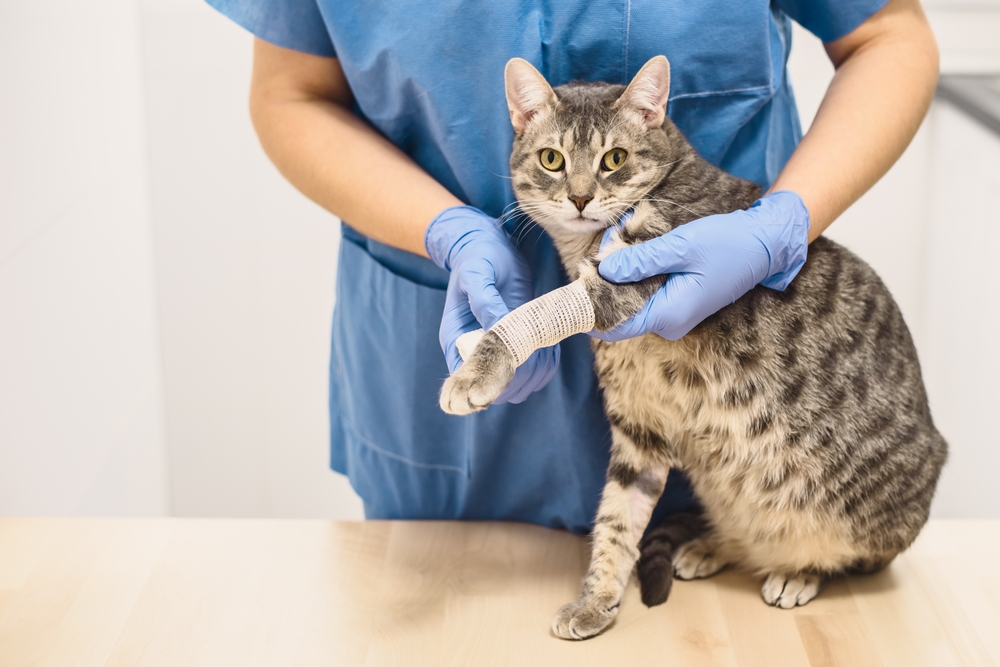One of a pet owner’s most challenging and anxiety-inducing experiences can be determining whether your furry friend needs urgent or emergency medical attention. Knowing the difference can be crucial in providing the appropriate level of care. Our Southern Kern Veterinary Clinic team’s guide will help you understand the signs to look for and how you can determine the care level your pet requires.
What is urgent care for pets?
Urgent care is required for pets with medical issues that need attention within 24 to 48 hours but are not immediately life-threatening. Such situations may cause significant discomfort or distress, but your pet can wait for a promptly scheduled veterinary appointment or a visit to an urgent care facility.
Common urgent care scenarios in pets
Urgent care situations cover a wide range of medical conditions in pets that should be treated quickly, such as:
- Vomiting and diarrhea — Occasional vomiting or diarrhea can often be managed at home. However, if they persist for more than 24 hours, are accompanied by lethargy, or contain blood, it’s time to seek urgent care.
- Limping or mild injury — A minor limp or a small cut can typically wait until the next day for veterinary care. However, if the limping persists, or the wound seems infected, urgent care is necessary.
- Ear infections — Signs like head shaking, ear scratching, or a foul ear odor can indicate an ear infection. While not an emergency, these issues should be addressed promptly, as ear infections can rapidly worsen and cause your pet significant pain.
- Mild allergic reactions — Mild allergic reaction signs, such as localized swelling or itching, can usually be managed with antihistamines that your Southern Kern Veterinary Clinic veterinarian will recommend. However, if the reaction worsens or signs persist, seek urgent care.
- Minor respiratory issues — Mild coughing or sneezing may be caused by upper respiratory infections, kennel cough, or other issues, and warrant a veterinary visit if the signs persist.
What is emergency care for pets?
Emergency care involves situations where your pet’s life is at immediate risk, and they will require prompt action to save their life or prevent severe harm at an emergency clinic that is open around the clock.
Common emergency care scenarios in pets
While an emergency situation may seem easy to identify, making that decision when you are in a panic over your ill or injured pet can be difficult. Your furry friend may need emergency treatment in the following scenarios:
- Severe trauma — If your pet has been hit by a car, fallen from a height, or suffered any significant physical trauma, they need immediate care. They may appear uninjured, but internal injuries are common with blunt-force trauma, despite not being immediately obvious.
- Difficulty breathing — Labored breathing, gasping for air, or blue-tinged gums are signs that your pet needs immediate emergency care.
- Seizures — If your pet experiences a seizure that lasts more than a few minutes or has multiple seizures in a short period, seek emergency care immediately.
- Unconsciousness — If your pet is unconscious or unresponsive, this clearly signals a serious condition that requires immediate veterinary intervention.
- Bloat — Bloat is a painful life-threatening condition, common in deep-chested dogs, where the stomach twists. Signs include a distended abdomen, unproductive vomiting, and restlessness.
- Severe allergic reactions — Swelling of the face or throat, difficulty breathing, or collapse after a bee sting, or exposure to a potential allergen mean your pet requires immediate attention.
- Toxic substance ingestion — If your pet ingests a potentially toxic item (e.g., chocolate, certain plants, or human medications), contact an emergency veterinary hospital immediately.
When does your pet need urgent or emergency care?

Determine if your pet needs urgent or emergency care—rather than waiting for a “regular” appointment with your Southern Kern Veterinary Clinic veterinarian—by assessing:
- Behavior changes — Sudden, drastic behavior changes, such as extreme lethargy or aggression, can indicate serious health issues.
- Physical signs — Look for signs like difficulty breathing, uncontrolled bleeding, severe pain, or inability to stand or walk.
- Duration of signs — Persistent symptoms that don’t improve in a few hours often require urgent care, while signs that rapidly worsen or appear suddenly often indicate an emergency.
When your pet is ill or injured and you cannot decide whether they need urgent or emergency care, always contact your Southern Kern Veterinary Clinic veterinarian or an emergency veterinary hospital. Our team can triage your pet’s condition over the phone and guide you on the correct course of action.

